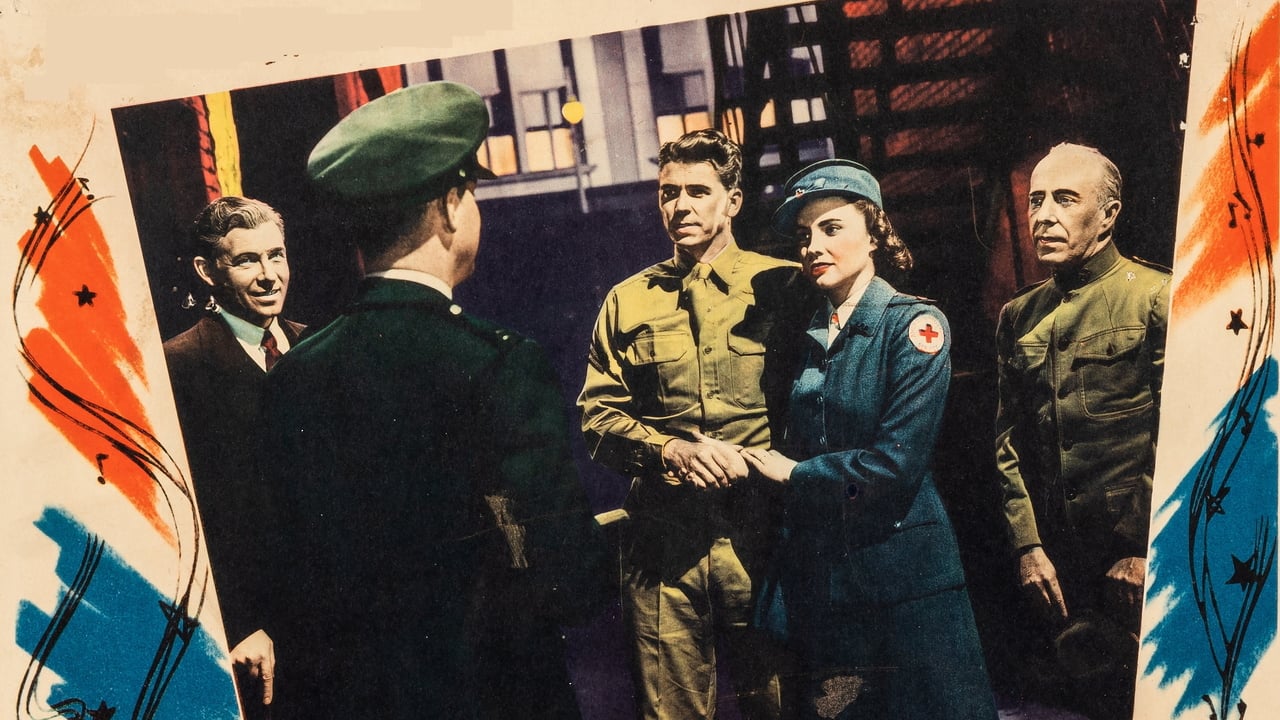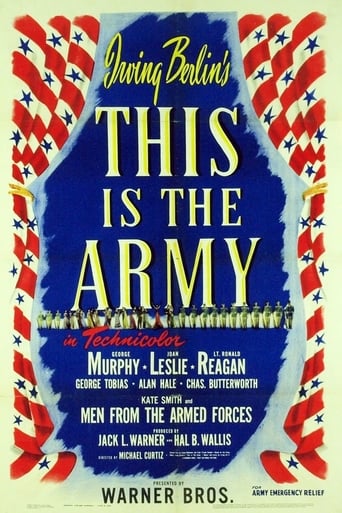Infamousta
brilliant actors, brilliant editing
InformationRap
This is one of the few movies I've ever seen where the whole audience broke into spontaneous, loud applause a third of the way in.
Tyreece Hulme
One of the best movies of the year! Incredible from the beginning to the end.
grandcyn
We remember seeing the original This Is the army many years ago; this was fun to watch both because of the music and dancing and because it captured the patriotic fervor of the time; also there were parts I didn't remember seeing before, e.g. the Stage Door Canteen and Irving Berlin singing ..Hate to Get Up ..though my husband did ( I'm dating myself :-) canteen song the other reviewers described it perfectly and I really don't have anything to add to their comments; except that it was interesting to learn what that reviewer wrote about Yip Yip Yank about which show I knew nothing; I must see if there is a trivia section here; the singers are superb! are they talented servicemen ( the crdits give military rank in front of their names) or Broadway performers who joined or weredrafted into t army?
Jay Raskin
For those who love to watch flag waving men in uniform doing musical numbers in drag, this film is your heaven. Add a little minstrel show, black face comedy, and a variety of acts from a magician to star impersonators, to acrobats to Air Force and Navy glee clubs and you have one of the gayest pieces of pro-military pop-corn imaginable. This is a 1943 version of the Ed Sullivan Show on steroids.This movie seems to have A.D.D. It moves from subject to subject in a rather willy-nilly fashion, but it is tied together with waving flags and marching/tap dancing men in uniform, and the fact that Irving Berlin wrote both the two or three classic songs and the fourteen or fifteen duds. One could watch every scene in reverse order and get the same effect. It is a parade celebrating pro patria mori. It is a broken record that just keeps repeating that it is glorious to be a soldier because it is not glorious to be a soldier.Yet, it lacks conviction, which is what makes it such tiresome propaganda. Why is it arguing that World War II is a continuation of World War I? Why does it have twenty minutes of men in drag singing and dancing, but only one minute of men in battle? Why is it advocating that men should get married before they go off to war? Why does it say that war is hell because you have to get up early in the morning, especially when every working man in America had to get up at the same time? There is something chilling about this movie: the way it uses song and dance and vaudeville theater to promote war. What I can not figure out is why I love Michael Curtiz's "Yankee Doodle Dandy" which celebrated George M. Cohan's patriotic song contributions, while I disliked this movie which celebrates the same thing in Irving Berlin? Maybe it is because James Cagney glides across the screen with grace and an open heart, while this movie is just an army trampling everything in its path.
bkoganbing
Most of Irving Berlin's shows on Broadway were revues and not book type shows. For that reason they're not frequently revived. All of them contain topical jokes that only history majors like myself would get now. But the extreme topicality of This Is The Army and its World War I predecessor Yip Yap Yaphank guarantee you don't see this one revived too often no matter how many good songs come from it.Even to do This Is The Army we have a threadbare plot of sorts. George Murphy is a song and dance man doing the lead in the Ziegfeld Follies when he gets his draft notice for World War I. Like Irving Berlin in real life, he offers to put his entertainment talents at the army's disposal. Murphy also marries Rosemary DeCamp at the same time he goes in the army. Flash forward to a new World War and Murphy's son Ronald Reagan is going out with Joan Leslie who's the daughter of Charles Butterworth another performer from the Yip Yap Yaphank show back in the day. Reagan gets his draft notice just like dear old dad and he says let's put on a show for the boys. Of course dear old dad volunteers to help as do other veterans of the World War I show.One thing that Warner's was smart about, they didn't give Ronald Reagan any singing or dancing to do. Reagan's talents such as they are were confined to behind the curtain.A lot of Hollywood regulars are mixed with members of the original cast of actual soldiers who put on This Is The Army on Broadway. The score is also a mixed one with Irving Berlin allowing several of his older numbers mixed in with the Broadway score of This Is The Army. Most particularly God Bless America which Kate Smith had introduced in 1939 and sang in the film. It dwarfs all the other numbers in the score by comparison, in fact it's only rival in popularity in this film is Irving Berlin's soldier's lament of Oh How I Hate To Get Up In The Morning. And that originally comes from Yip Yap Yaphank. And of course that other barracks ballad telling what civilians will have to do without, the title song of the show and the film.This Is The Army is dated flag-waving to be sure, but as Irving Berlin said in another song in another show, do you know of a better flag to wave? Both Yip Yap Yaphank and This Is The Army are the product of an immigrant kid who escaped poverty and persecution in the old world of Europe. If Irving Berlin's life isn't the American success story than I don't know a better example. He was grateful to his adopted country and these shows were his way of payback.I doubt if B picture actor Ronald Reagan had the remotest conception that he would be sitting in the White House as a tenant one day and that he would be giving the nation's greeting to Irving Berlin on his 100th birthday. But that's an American success story too.
MartinHafer
This is the type of musical that Hollywood did best and it sure was popular with the public. However, 65 years later, the film has lost much of its appeal due to changes in movie styles as well as the fact that the film's value as a propaganda tool is now lost--after all, the war has been over since 1945. So what was rousing and exciting then to the folks at home now just seems rather dated and slow--though the film still does have very good production values.The film is basically a bazillion patriotic songs rolled up into the thinnest of plots. Frankly, I think the film could have been a lot better had the story received greater emphasis and they'd dropped a few musical numbers. This would have given the film a much needed infusion of energy--though again, back during the war years, this wasn't as big a concern.The story, such as it is, begins during WWI. A group of soldiers (George Murphy, Alan Hale, George Tobias and Charles Butterworth and others) are interested in performing a musical to raise morale and the when they are given permission, the show is a huge hit. Many years later, when WWII arrives, the children of these same men and others put on their new and timely stage show. It's a major success and the soldiers are sent on a tour of the USA to increase the public's patriotism and backing of the war. There's a little more to the plot than this--but not much.As I said, it's really just an excuse to string together tons of musical and dance numbers--so many that you feel a bit overwhelmed. Some of the numbers are very good, the one with Irving Berlin was interesting (not good--just interesting from a historical sense) and a few were rather bad. The worst was the one that was a minstrel show--something that you'd hoped would have died out by 1943. It was just embarrassing and makes you cringe. Also, in a few separate parts of the film, Joe Lewis made some irrelevant appearances, as he couldn't sing and was as light on his dancing feet as a rhino! He just looked very lost but you can't blame him--he was ordered to appear in the film and since he was a sergeant, he had no choice! If I could, I'd give the film a score for 1943 (8) and one for today (4 or 5). But, since I can't, I'll give it a 6. Interesting from a historical standpoint but pretty tough going at times, though some of the songs were catchy and the color cinematography was lovely.As a history teacher, I was a bit concerned with a couple reviews that gave the film a 1. It wasn't nearly that bad and some of the reasons they gave it such a low score seemed petty. One was a diatribe about why they hated Ronald Reagan and really didn't review the film itself. Another was very critical about how the film was propaganda. My answer to that is YES it is propaganda and so what?! Given that it was a life and death struggle for survival in WWII only a knucklehead would see this sort of propaganda as an evil! Should Hollywood have either ignored the war or done pro-Hitler films instead?! Read your history books or talk to some vets before you make such silly assertions.

